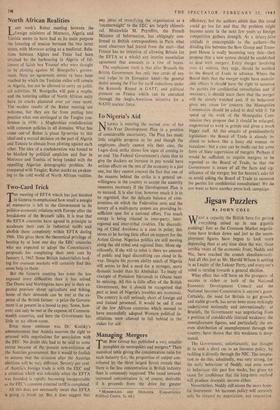To Nigeria's Aid
NIGERIA is entering the second year of her Six-Year Development Plan in a position of considerable uncertainty. The Plan has made little tangible progress so far and though the employees clearly cannot win their case, the Lagos dock strike shows few signs of coming to an end. The Federal Government's claim that to give the dockers an increase in pay would have serious effects on the test of the economy is a just one, but they cannot conceal the fact that one of the reasons behind the strike is a general un- willingness in the country to accept the austerity measures necessary if the Development Plan is to succeed. It is also true, however much it is to be regretted, that the delicate balance of com- promises on which the Federation rests and the luxury of a multi-party system are providing in- sufficient spur for a national effort. Too much energy is being vitiated in inter-party, inter- regional and inter-tribal rivalries. The discredit- ing of Chief Awolowo is a case in point; this seems to be having little effect on support for the Action Group. Nigerian politics are still moving along the old tribal and regional lines. More sig- nificantly, if the will to rebel is there no amount of public and legal discrediting can stand in its way. Despite his proven ability much of Nigeria still seems to feel a need for a stronger, more dymanic leader than Sir Abubakar. To many of example of President Nkrumah in Ghana must be enticing. All this is little affair of the British Government, but it should be recognised that part at least of Nigeria's troubles are economic. The country is still seriously short of foreign aid and trained personnel. It would be sad if one of the few African countries which seemed to have successfully adopted Western political in- stitutions were allowed to fall behind in the. stakes for aid.


































 Previous page
Previous page